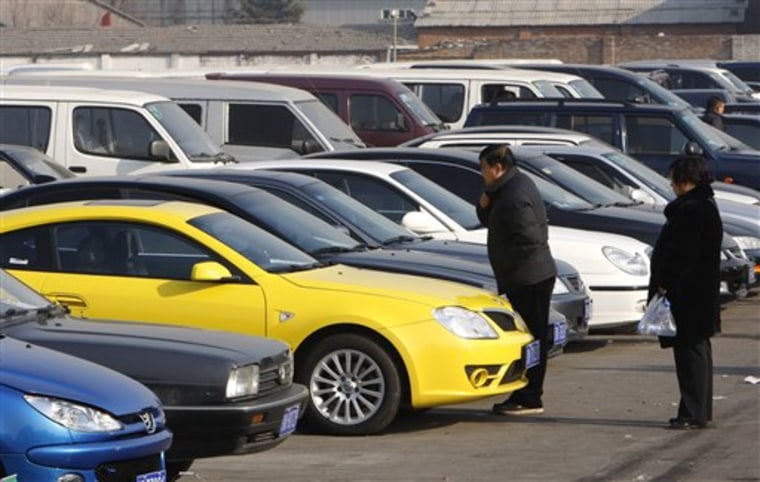Two years ago, China zoomed past Japan to become the world's No. 2 vehicle market.
Now it looks poised to pass up the United States to be the biggest.
While car sales in China have slowed lately, they haven't plummeted like those in the U.S., where January sales tumbled 37 percent from a year ago to 656,976 vehicles, a 26-year low.
Official Chinese auto data comes out next week, but January sales are expected to decline 8 percent to 790,000 units, Zhang Xin, an analyst at Guotai Junan Securities in Beijing, said Wednesday.
"This is the first time in history that China has passed the United States in monthly sales," Mike DiGiovanni, General Motors Corp.'s executive director of global market and industry analysis, said in a conference call late Tuesday.
DiGiovanni projects that Chinese auto sales could hit 10.7 million vehicles in 2009, more than his estimate of 9.8 million unit sales in the U.S. this year. Autodata Corp. forecasts 2009 U.S. sales at 9.57 million.
General Motors, which last year surrendered its crown as world's largest automaker by annual sales to Toyota Motor Corp., has a clear stake in China's automotive future.
GM is already is one of biggest automakers in China, with billions of dollars invested in joint ventures, and a record 1.09 million vehicles sold in 2008, up 6 percent from the year before. Like its global rivals, GM has been counting on the growth in China and other emerging markets to help offset losses elsewhere.
China overtook Japan in 2006 to become the world's second-largest vehicle market, thanks to strong sales to the country's fast-growing middle class. With 1.3 billion people, China was bound to catch up with the U.S. — population 300 million — at some point, but the dramatic contraction of the American market could make that happen sooner than expected.
Of course, if U.S. sales recover strongly in coming months, outpacing those in China, the American market would remain the world's biggest.
China's auto market has cooled after several years of torrid growth, and authorities have implemented tax cuts, subsidies for small-car purchases and plenty of promotions are luring car buyers back into showrooms.
Police officer Zhou Yingbin, newly married and facing a tough commute, recently spent three hours haggling in a Shanghai dealership, and saved himself a few hundred dollars off the price of his new Honda Fit.
"It's worth being patient since I know the salesman really wanted to get the deal," Zhou said. "In the end, I left with my new Fit in a very good mood."
The moves to stimulate consumer demand is part of broader attempts by Beijing to counter the plunge in export demand that is dragging on China's economy.
In the auto market, the government has halved the tax on purchases of cars with engines less than 1.6 liters, to 5 percent, until the end of the year. It is spending 5 billion yuan (about $730 million) on subsidies to farmers replacing their three-wheeled vehicles or outdated trucks with small, 1.3-liter or less vehicles.
The push is to promote more energy efficient vehicles while improving the competitiveness of the country's highly fragmented auto industry: some 10 billion yuan ($1.5 billion) is going into upgrading automakers' technology and developing alternative energy vehicles.
So far, the steps seem to be helping somewhat.
"Customers feel it's a good chance to buy a car for less since the tax cut is temporary. Also with lower gasoline prices, people are less worried about fuel costs," said Gao Zhiyuan, a salesman at Shanghai Automobile Industry Hudong Sales Co., a Volkswagen dealership.
The dealership has been offering free laptops, fuel cards worth hundreds of dollars, and deep discounts on its VW Polos and other economy models.
Last year, China's domestic auto sales grew 6.7 percent to 9.38 million units — the first time growth has fallen below 10 percent since 1999. And while January's estimated sales were lower than the monthly record 860,000 sold in January 2008, they were up from 584,600 in December.
Small cars accounted for nearly two-thirds of the vehicles sold in China last year, a trend that is helping both domestic and foreign-brand automakers.
Commercial vehicles such as trucks and buses make up a larger chunk of China's vehicle market than in the U.S. and Japan, causing some observers to say comparing statistics is misleading.
While figures for January were not available, in 2008 passenger cars accounted for 6.76 million, or about three-quarters of total sales, with commercial vehicles accounting for the remaining 2.65 million, according to the China Association of Automobile Manufacturers.
Still, even though China's auto industry may appear to be weathering the crisis with less of the misery seen in the Detroit and elsewhere, it still has a long way to go to catch up with global rivals by other measures, Zhang, the analyst, cautioned.
"Our technology is still weak. We still have to copy or use Western advanced manufacturing systems," he said. "That's kind of awkward, isn't it?"
